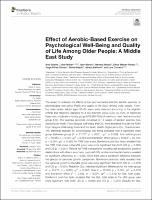Por favor, use este identificador para citar o enlazar este ítem:
https://repositorio.usj.es/handle/123456789/785
| Título : | Effect of Aerobic-Based Exercise on Psychological Well-Being and Quality of Life Among Older People: A Middle East Study |
| Autor: | Shams, Amir


Nobari, Hadi 


Afonso, José 


Abbasi, Hamed 


Mainer Pardos, Elena 


Perez-Gomez, Jorge 


Bayati, M. 


Bahrami, Alireza 

Carneiro, Lara 
|
| Palabras clave : | Cardiovascular fitness; Mental health; Old people; Physical fitness; Dose-response |
| Fecha de publicación: | 6-dic-2021 |
| Editorial : | FRONTIERS MEDIA SA |
| Citación : | Shams A, Nobari H, Afonso J, Abbasi H, Mainer-Pardos E, Pérez-Gómez J, Bayati M, Bahrami A and Carneiro L (2021) Effect of Aerobic-Based Exercise on Psychological Well-Being and Quality of Life Among Older People: A Middle East Study. Front. Public Health 9:764044. doi: 10.3389/fpubh.2021.764044 |
| Resumen : | The aimed to evaluate the effects of low and moderate-intensity aerobic exercise on psychological well-being (PWB) and quality of life (QoL) among older people. Forty-five male Iranian adults aged 65-80 years were selected according to the eligibility criteria and randomly assigned to a low-intensity group (LIG) (40-50% of maximum heart rate), moderate-intensity group (MIG) (60-70% of maximum heart rate) and control group (CG). The exercise protocols consisted of 12 weeks of aerobic exercise (two sessions per week). Psychological well-being and QoL were assessed through the Ryff's Psychological Well-being Scale and the World Health Organization QoL Questionnaire. The statistical analysis for psychological well-being indicated that a significant main group (between-group) (F = 11.777, p < 0.001, eta p(2) = 0.359), time (within-group) (F = 58.983, p < 0.001, eta p(2) = 0.584) and interaction effect (group x time) (F = 20.146, p < 0.001, eta p(2) = 0.490) for PWB total score. Bonferroni post-hoc tests revealed that the PWB total score in the MIG group was more significant than both LIG (p = 0.003) and CG (p < 0.001). Results for PWB components including self-acceptance, positive relationships with others, autonomy, purposeful life, and environmental mastery revealed no significant differences (p > 0.05). While there was a significant difference between the groups for personal growth component. Bonferroni post-hoc tests revealed that the personal growth in the MIG group was more significant than both LIG (p = 0.028) and CG (p < 0.001). Result for QoL indicated significant differences for the main group (F = 13.277, p < 0.001, eta p(2) = 0.387), time (F = 25.533, p < 0.001, eta p(2) = 0.378) and interaction effect (F = 9.992, p < 0.001, eta p(2) = 0.332) for QoL total scale. Bonferroni post-hoc tests revealed that the QoL total scale in the MIG group was more significant than both LIG (p = 0.003) and CG (p < 0.001). Results for QoL components including Physical health, Social relationships, Health environment revealed no significant differences (p > 0.05), while there was a significant difference between the groups for the Psychological health component. Bonferroni post-hoc tests revealed that the Psychological health in the MIG group was more significant than both LIG (p = 0.009) and CG (p = 0.002). Therefore, aerobic exercise improves PWB and QoL in older adults, moderate-intensity exercise seems to produce higher benefits than low-intensity, demonstrating a positive dose-response relationship. |
| URI : | https://repositorio.usj.es/handle/123456789/785 |
| ISSN : | 2296-2565 |
| Aparece en las colecciones: | Artículos de revistas |
Ficheros en este ítem:
| Fichero | Descripción | Tamaño | Formato | |
|---|---|---|---|---|
| Effect of Aerobic-Based Exercise on Psychological Well-Being and Quality of Life Among Older People.pdf | 581,2 kB | Adobe PDF |  Visualizar/Abrir |
Este ítem está sujeto a una licencia Creative Commons Licencia Creative Commons

